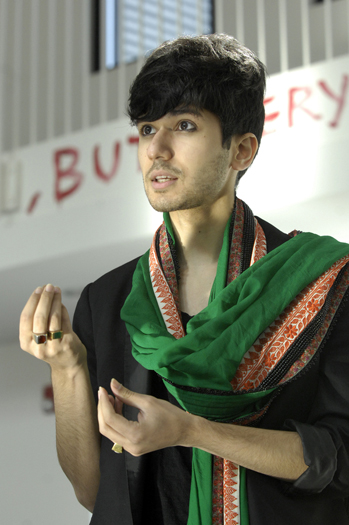
BB Chokra gestures fluidly with his hands, his head angled slightly as his wrist flicks subtly while he breaks into a staccato-style multilingual verse of free-flow poetry and song.
The words delivered have been cultivated from numerous sources; the lyrics represent his native culture and the one that he has come to know—born in Dubai in the United Arab Emirates, he has lived in New York City for the past six years.
Into verse he weaves words of his native tongue, Arabic, and languages of neighboring countries like Urdu and Hindu. A lilting accent defines each syllable
and the images painted by his rhyme approach in number the same amount of tactile resources he will incorporate in his upcoming performance-in-progress “Al Mtsaalh Haal: The Trucial Case.”
The free performance, which is slated for Saturday, December 18, at 5 p.m. at The Watermill Center, will also include digital and analog sound; animations; transnational costume; dispersals of tangible materials like saturated pigment; aromas such as jasmine and sandalwood; pyromania and video projected on smoke—all of which will be performed outdoors atop a large platform. It will be the final public presentation of the Watermill Center’s winter 2010 residency season.
There is a personal significance in the title, “The Trucial Case,” as Chokra’s native country, Dubai, was once only one of 11 sheikdoms in the Persian Gulf. Aligned under a truce, Dubai and the other sheikdoms were a protectorate of the United Kingdom. The states broke the truce in 1972 and eventually coalesced into the United Arab Emirates; the notion of states once divided and then reunified, lends some explanation to Chokra’s spectacle.
But the young artist’s surname also conveys a larger role in the work itself. Chokra is the artist’s namesake, but for performance he has translated his name into an acronym which he said he believes best conveys the experience he strives to create: the Cultivated Hoarding of Kinetic Rage Associated (CHOKRA).
“CHOKRA associates the intent of love with rage ... As I rant via rap rhyming, I intend to create an overall heightened experience, asserting my rage toward dated and overused terms, [in example] diaspora,” he said.
Diaspora, the displacement of a culture into forced exile, serves as a springboard for some of the tactile elements Chokra incorporates. He takes his rage toward the inequality of the word and the event in and of itself, and turns it on its head.
For instance, one of the lines used, “Diaspora is a diaper,” is spoken as baby powder is dispersed into the air for both artist and audience to physically smell, feel and consume.
Much like an infant’s chafed skin is relieved by the salve of powder, he explained, his form of expression “is an attempt to assert and alleviate the rashes of those inflicted while maintaining the premise of love.”
In verse and video, Chokra addresses a wide range of issues.
“Everything has the ability to transform, ideas, words, images, everything is constantly changing yet there is a sense of integration in all of this too...And I want the audience to find themselves fully brought into the experience; I seek total integration,” he said.
For example, the projection of video onto smoke also exhibits the recurring theme of transformation.
“The image is somewhat distorted, yet it can be seen wholly. I also enjoy the idea of smoke as it is made of so many particles and everything may be broken down into precisely that,” he said.
Selected into the Watermill Center’s residency program in May, Chokra has taken advantage of the quietude, among other things, the center provides for resident artists.
Watermill Center Director Sherry Dobbin explained the idea behind the residency program. “The center is a place for artists to live, work, create and grow together in a setting where their art can be honed with the input of other artists and our extensive collection of resources,” she said.
A notable resource: The archive room, which contains hundreds of pieces of art collected by Watermill Center Founder Robert Wilson, spanning from the Neolithic Era to contemporary periods. The room is fully accessible to resident artists, serving as a wellspring for inspiration.
Upon his arrival at the center, Chokra noted two different sources of inspiration found there—poetry by the autistic writer Christopher Knowles and a print by an unknown artist, “Homme Masque De L’isle Sandwich,” which depicts the bust of a man donning a mask that slightly resembles a burqa.
Chokra noted that Mr. Knowles’s poetry piqued his interest because the complete destruction of typical writing patterns excited him. Chokra’s own free-flow verse is similar to Mr. Knowles’s breaking down of structural language barriers and much like the ink-on-paper print, which he said reignited familiar images for him to draw upon and dissect.
Chokra’s upcoming performance relies on all of the senses. As a unique experience for guests, even touch and taste are part of the equation. Hot charcoals will be burned during the performance for audience warmth and hot tea will bolster the same efforts. Afterward, the audience will dine indoors on Arabic biryani, a dish of chicken, rice and spices—made by the artist.
By the performance’s end, Chokra said that he aspires to have provided a fulfilling experience for his audience.
“I was a rather dramatic child, and there’s a word for it in Arabic, “
tamasha,”
it refers to spectacle, the melodramatic, a world of endless possibilities and the quality of uniqueness in everything,” he said.
And with months of effort and so many parts operating in tandem, a spectacle is exactly what Chokra said he hopes it will be.
“Al-Mtsaalh Haal: The Trucial Case” by CHOKRA (Conscious Hoarding of Kinetic Rage Associated) is planned for Saturday, December 18, at 5 p.m. at The Watermill Center. The performance is free but reservations are required, visit chokra.eventbrite.com or watermillcenter.org for additional details.